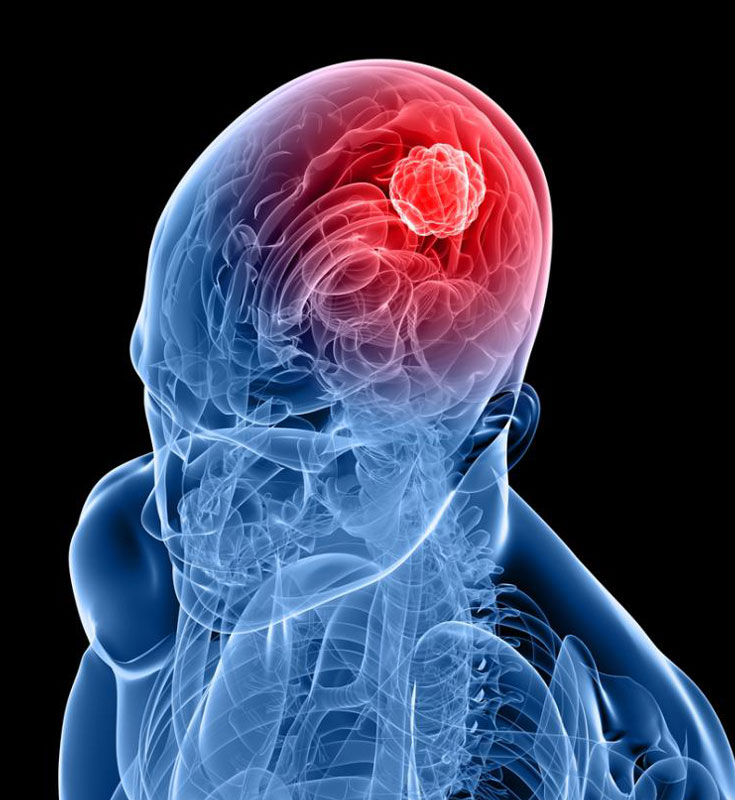Kalra Brain & Spine
At KBS, we treat our patients as neighbors, friends, and family. Our goal is to educate you, treat your symptoms, and help you recover as fast as possible
Brain Tumors
A brain tumor is a mass or growth of abnormal cells in your brain.
Many different types of brain tumors exist. Some brain tumors are noncancerous (benign), and some brain tumors are cancerous (malignant). Brain tumors can begin in your brain (primary brain tumors), or cancer can begin in other parts of your body and spread to your brain (secondary, or metastatic, brain tumors).
How quickly a brain tumor grows can vary greatly. The growth rate as well as location of a brain tumor determines how it will affect the function of your nervous system.
Types of Brain Tumors
- Acoustic neuroma
- Astrocytoma
- Brain metastases
- Choroid plexus carcinoma
- Craniopharyngioma
- Embryonal tumors
- Ependymoma
- Glioblastoma
- Glioma
- Medulloblastoma
- Meningioma
- Oligodendroglioma
- Pineoblastoma
- Pituitary tumors
Symptoms
The signs and symptoms of a brain tumor vary greatly and depend on the brain tumor’s size, location and rate of growth.
General signs and symptoms caused by brain tumors may include:
- New onset or change in pattern of headaches
- Headaches that gradually become more frequent and more severe
- Unexplained nausea or vomiting
- Vision problems, such as blurred vision, double vision or loss of peripheral vision
- Gradual loss of sensation or movement in an arm or a leg
- Difficulty with balance
- Speech difficulties
- Confusion in everyday matters
- Personality or behavior changes
- Seizures, especially in someone who doesn’t have a history of seizures
- Hearing problems
Risk Factors/Causes
Primary brain tumors originate in the brain or in tissues close to it, such as in the brain-covering membranes (meninges), cranial nerves, pituitary gland or pineal gland. Primary brain tumors begin when healthy cells acquire errors (mutations) in their DNA. These mutations allow cells to grow and divide at increased rates and to continue living when healthy cells would die. The result is a mass of abnormal cells, which forms a tumor. In adults, primary brain tumors are much less common than are secondary brain tumors, in which cancer begins elsewhere and spreads to the brain. Many different types of primary brain tumors exist. Each gets its name from the type of cells involved. Examples include:
Many different types of primary brain tumors exist. Each gets its name from the type of cells involved. Examples include:
- Gilomas. These tumors begin in the brain or spinal cord and include astrocytomas, ependymomas, glioblastomas, oligoastrocytomas and oligodendrogliomas.
- Meningiomas. A meningioma is a tumor that arises from the membranes that surround your brain and spinal cord (meninges). Most meningiomas are noncancerous.
- Acoustic neuromas (schwannomas). These are benign tumors that develop on the nerves that control balance and hearing leading from your inner ear to your brain.
- Pituitary adenomas. These are mostly benign tumors that develop in the pituitary gland at the base of the brain. These tumors can affect the pituitary hormones with effects throughout the body.
- Medulloblastomas. These are the most common cancerous brain tumors in children. A medulloblastoma starts in the lower back part of the brain and tends to spread through the spinal fluid. These tumors are less common in adults, but they do occur.
- Germ cell tumors. Germ cell tumors may develop during childhood where the testicles or ovaries will form. But sometimes germ cell tumors affect other parts of the body, such as the brain.
- Craniopharyngiomas. These rare, noncancerous tumors start near the brain’s pituitary gland, which secretes hormones that control many body functions. As the craniopharyngioma slowly grows, it can affect the pituitary gland and other structures near the brain.
Secondary (metastatic) brain tumors are tumors that result from cancer that starts elsewhere in your body and then spreads (metastasizes) to your brain. Secondary brain tumors most often occur in people who have a history of cancer. But in rare cases, a metastatic brain tumor may be the first sign of cancer that began elsewhere in your body. In adults, secondary brain tumors are far more common than are primary brain tumors. Any cancer can spread to the brain, but common types include:
- Breast cancer
- Colon cancer
- Kidney cancer
- Lung cancer
- Melanoma
In most people with primary brain tumors, the cause is not clear. Some factors that may increase your risk of a brain tumor include:
- Exposure to radiation. People who have been exposed to a type of radiation called ionizing radiation have an increased risk of brain tumor. Examples of ionizing radiation include radiation therapy used to treat cancer and radiation exposure caused by atomic bombs.
- Family history of brain tumors. A small portion of brain tumors occurs in people with a family history of brain tumors or a family history of genetic syndromes that increase the risk of brain tumors.
Treatment Options
Treatment for a brain tumor depends on the type, size and location of the tumor, as well as your overall health and preferences. Treatment options include:
- Surgery to remove some or all of the brain tumor. Even removing a portion of the brain tumor may help reduce your signs and symptoms.
- Radiation Therapy uses high-energy beams, such as X-rays or protons, to kill tumor cells. Radiation therapy comes from a machine outside your body (external beam radiation), or, in very rare cases, radiation can be placed inside your body close to your brain tumor (brachytherapy).
- Radiosurgery uses multiple beams of radiation to give a highly focused form of radiation treatment to kill the tumor cells in a very small area.
- Chemotherapy is medications used to kill tumor cells. Chemotherapy drugs can be taken orally in pill form or injected into a vein (intravenously).
- Targeted Drug Therapy focuses on specific abnormalities present within cancer cells. By blocking these abnormalities, targeted drug treatments can cause cancer cells to die. Targeted therapy drugs are available for certain types of brain tumors, and many more are being studied in clinical trials.
New Hope From a Brain Expert
When world-class training meets hometown values deeply rooted in family and community, the result is the kind of medical care you’ve always hoped for. This describes Kalra Brain & Spine, the practice of Dr. Ricky Kalra, who specializes in the most up-to-date evidence-based neurological care. If your condition requires neurosurgery, schedule a consultation with Dr. Kalra today.
Request an Appointment
Contact us
Get In Touch
Address
Kalra Brain & Spine
5899 Preston Road
Suite 1303
Frisco, TX 75034
Phone
972-905-9226

Fax
972-905-9269

